The Farm Awaroa has become a haven with a purpose to heal
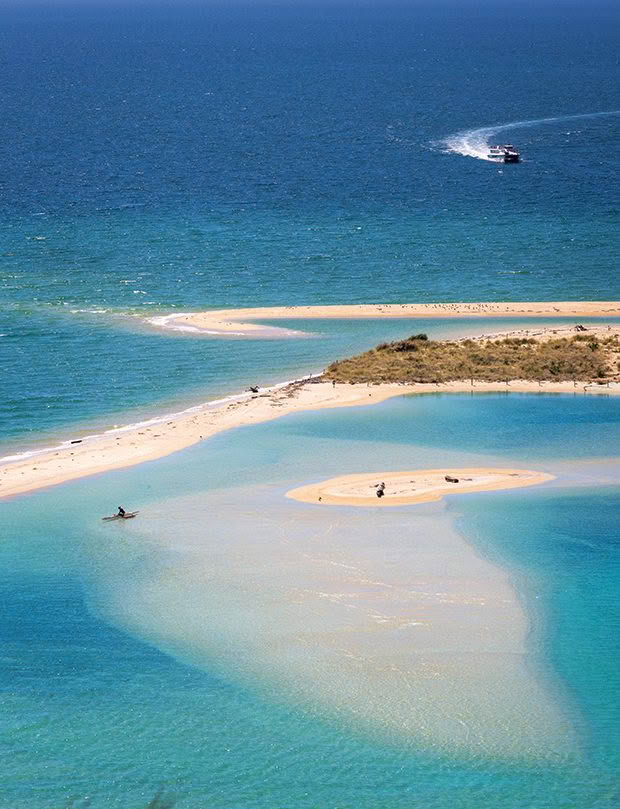
Kellianne paddles across the clear waters of Awaroa. If the beach’s name sounds familiar, it’s because it’s the one “owned by the people”. In 2016, when Awaroa — 800 metres of gold-sand coastline — threatened to fall into private hands, a crowdfunding effort involving more than 40,000 raised $2 million, including a $350,000 chip-in from the government.
A patch of remote farmland in Abel Tasman helped two sisters take their first steps towards healing. Now, they’ve created a retreat for others to do the same.
Words: Sarah Templeton Photos: Tessa Chrisp
Kellianne Karatau and Jo Chetwynd are taking a moment to “ground” against the meditation soundtrack of birdsong. The sisters have had a whirlwind couple of days with photographer Tessa Chrisp, navigating forecast rain and the tidal surges that mark the topography here in the Abel Tasman region. They need to catch their breath.
“Having Tessa here to view our life from a different angle — we’re just sitting in gratitude for that,” says Jo. “We sat down last tonight and took some moments to reflect on the opportunity to have someone else come into our life and give thought to what we’re doing … it’s been a beautiful couple of days.”
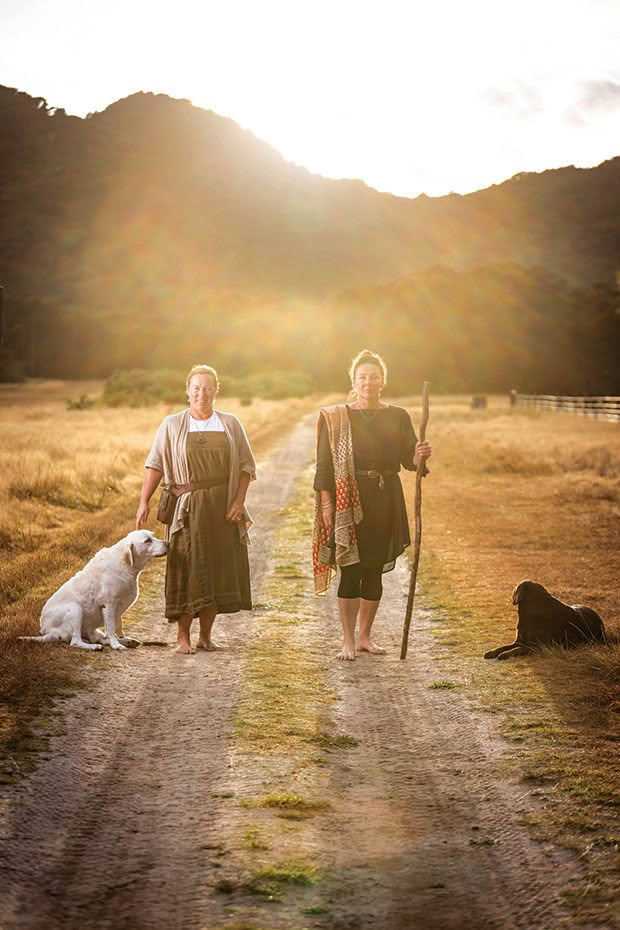
Sisters Jo Chetwynd (left) and Kellianne Karatau on one of the tracks into their remote property, accompanied by Ted (white lab) and Lexi (chocolate).
They recount their journey — at times, heartbreaking — over a slightly choppy video call. That’s to be expected when beaming into a remote section of land smack-bang on the Abel Tasman Coast Track. A parade of hikers and the occasional small aircraft landing on a backyard airstrip are sometimes startling reminders of the outside world.
Digital communications weren’t even possible when they moved here just over two years ago. “We had no phone coverage, internet, or wifi when we arrived. Our kids thought we were mad,” says Jo.
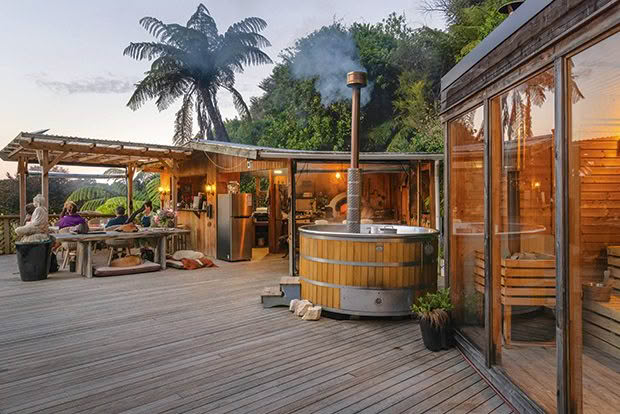
In the dining area, guests are served from a menu cooked by Kellianne. They often note how soundly they sleep in the four double pods on the property, all off-grid with a shared bathroom. “The previous owner had put in the accommodation pods and redeveloped different things on the property but hadn’t had a chance to activate things because of Covid-19.”
“But as time has passed and the more they come here, they know why we chose this place. They live busy lives, and this place is somewhere they come to de-stress, be fed well, and get back to nature.”
Their children — Kellianne’s three boys and Jo’s two boys and a girl, with a collective age span of 14 to 24 — are, in a way, the first guests of this wellness retreat, set to pick up steam this year. Reflection, grounding, and slowing down — however one refers to it — is the aim of those navigating the journey to The Farm Awaroa. Happily, such a state seems synonymous with simply stepping onto the property.
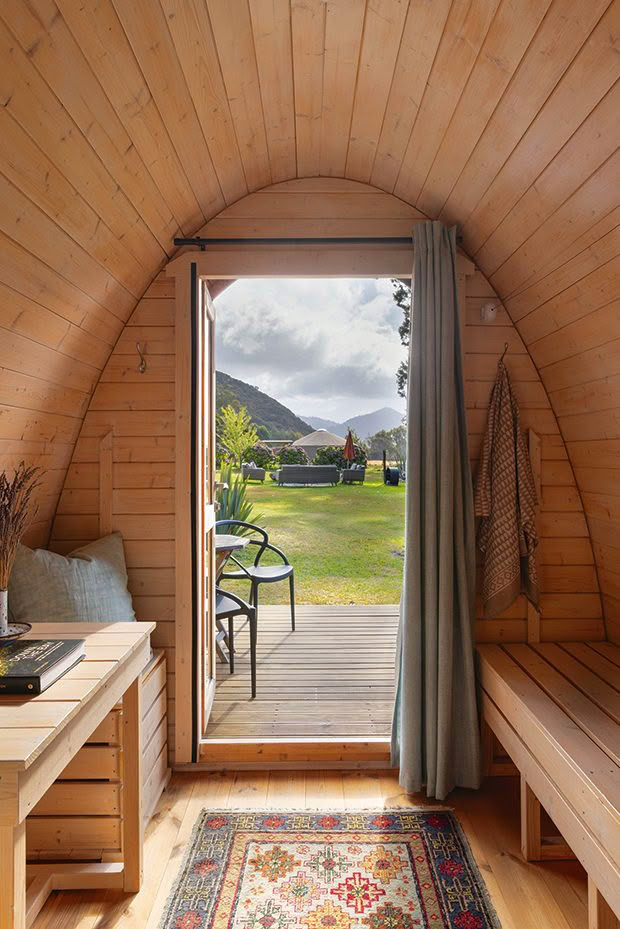
The spa and sauna are ideal for a warm-up after a morning dip.
“When we came to see it for the first time, we only needed a little while to know it had enough scope for us to do what we wanted to do, which was to live sustainably off-grid, have a space big enough to accommodate our two families, and earn some income from the land,” says Jo.
“Then coming in here and stepping onto it had such a beautiful feel. And it felt healing for us at that stage of our journey.”
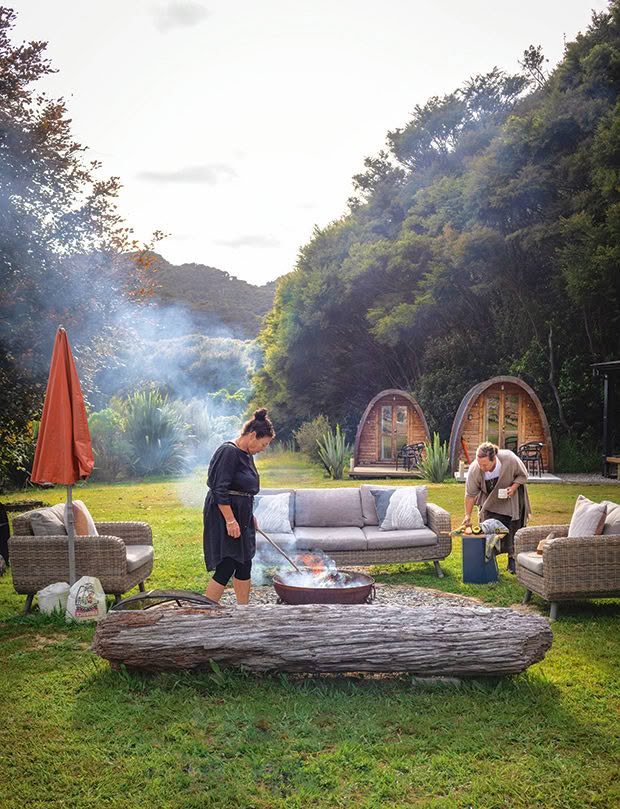
The accommodation is listed on Airbnb under “Abel Tasman National Park Cabin” — independent hikers exploring the area are welcome.
Rewind to 2019. Their year was marked by grief, and it threw the family onto an unexpected trajectory. Jo was in Auckland, finding her feet after a divorce. She was running a business and showing signs of burnout, so she considered a move to Wānaka to join Kellianne and her husband, Änt, to work on a new project.
“We’d been talking about it for months. And it was hard for me to leave. I still had my kids in Auckland and was co-parenting there. The bags were semi-packed,” she says. “And Änt kept saying, ‘You know what you need: to breathe a little bit more life into yourself. Come spend some time with your sister doing this project together.’”
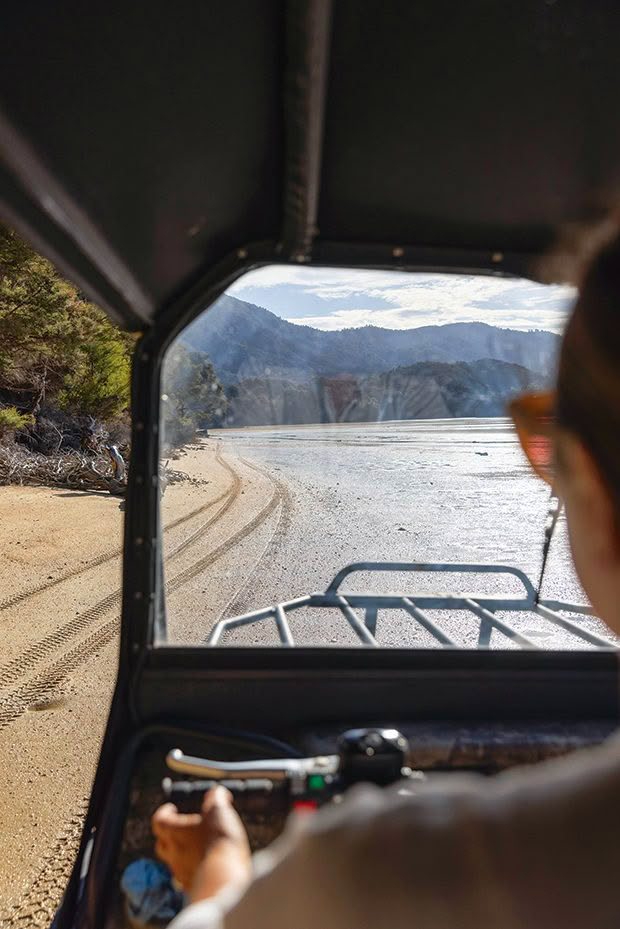
Time and tide dictate how guests arrive at The Farm Awaroa as all are brought in by community barge, seaplane or water taxi. “There is a sense of adventure and achievement for those arriving … their connection to nature begins with their journey in.” Supplies are also transferred by boat or all-terrain vehicles across the estuary.
Devastatingly, Änt passed away suddenly in August from cardiac arrest. “It was a complete shock, as you can imagine,” says Kellianne. Jo was by her sister’s side within 24 hours.
The sisters and their two siblings have always been close, even when they have lived in different countries. All were there within a day to help. Jo moved down from Auckland to support Kellianne — just as Änt suggested.
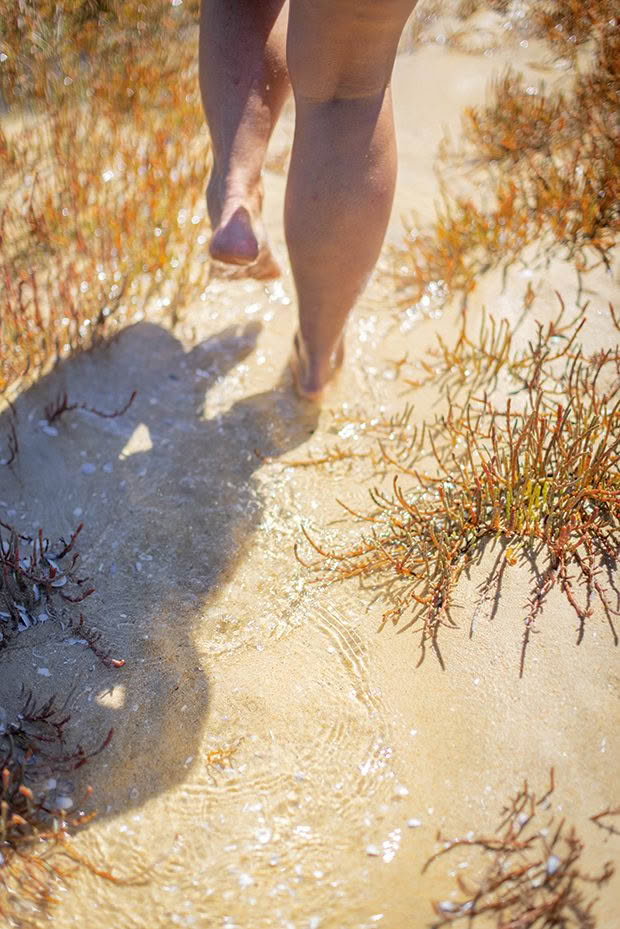
“It was sad and serendipitous and all those things.”
More upheaval came the following year when the Covid-19 pandemic scattered the family. It was a time of reset,” says Jo. “We were together in Wānaka, and our kids were in different locations. We sensed that we needed a sustainable space to gather.”
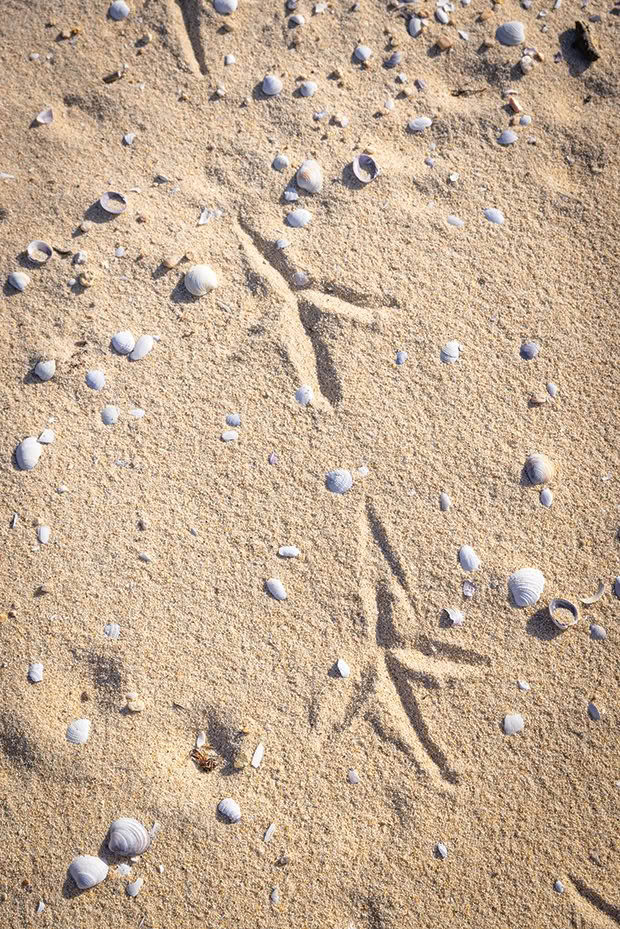
After a year of looking, such a property popped up in late 2021 in a private sale on TradeMe. “It was incredibly fortuitous. We thought: ‘Let’s just ring them.’ But I accidentally FaceTimed on the first call. Suddenly, we were face-to-face with the farm’s owner, a German man with a head of beautiful, wild, curly hair.
“He said, ‘Who are you?’ We said: ‘We think we’re the girls who’re going to buy your property’, and he said, ‘Yes, I think you are.’
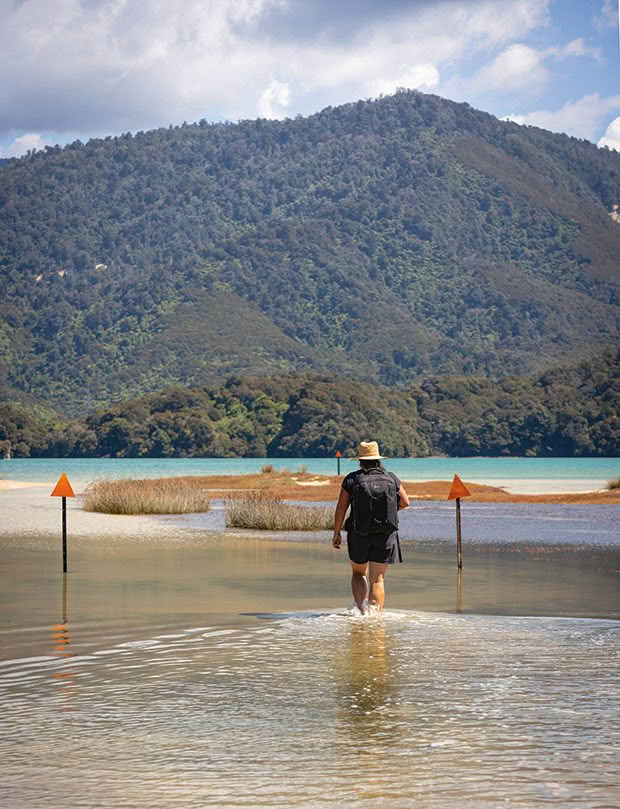
The sisters’ first year on “The Farm”, as the locals call it, was marked by books: on soil, on food growing, on livestock. Learning to wrangle the land stirred memories of the family’s early years on a farm in Taihape before a shift to Brisbane while three of the four siblings were still at school. “Mum was a great gardener, and I didn’t think I’d have that green thumb at all,” says Jo.
Helped by the locals and with much trial and error, slowly, surely, the sisters began seeing results. “We had 10 acres [a little over four hectares] of lawns to mow, which would take eight hours a week and cost loads in fuel. We put livestock back on and fenced the property.
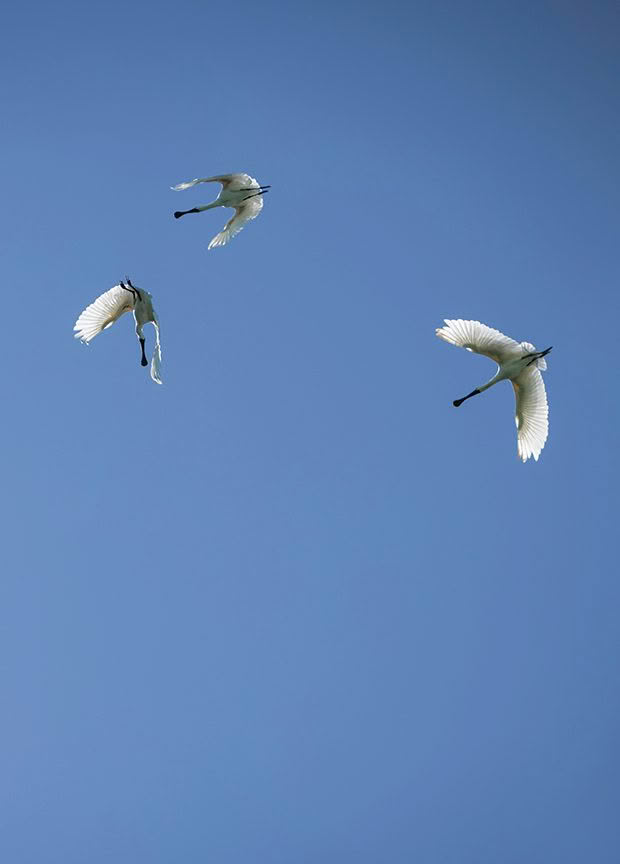
It’s rare to spot a royal spoonbill/kōtuku ngutupapa in flight. Nicknamed the “Dr Seuss birds” because of their slightly cartoonish way of flying, “they spend half their time in our estuary, fly around our big tree and swim in our pond”.
“By the end of the first year, we were pretty much eating fully off the land. It was about realising all those teachings from our formative farming years were there.”
Help came from an ex-partner of Jo’s who was present for the first year. Onlookers found sensibility in his presence, and he was a dab hand at boating, mechanics and farming. “Sadly, he didn’t stay, and when he was transitioning out, we heard the talk on the local grapevine was: ‘Those two sisters are not going to cope.’”
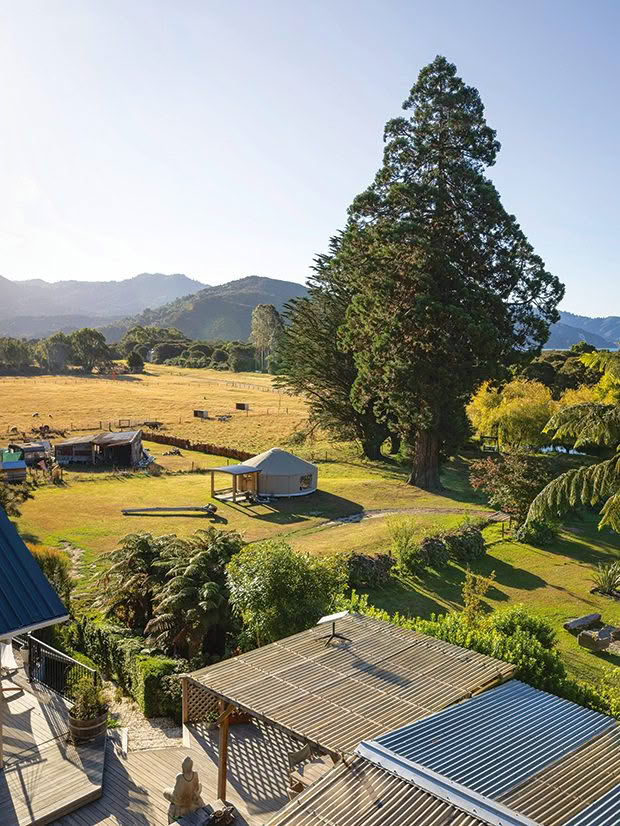
Milo Gilmour of Xanadu Yurts in Wānaka is responsible for the custom-built yurt.
Their first mission as a duo was purchasing a small flock of sheep from a local stock sale, which were then delivered to a nearby DOC car park for them to pick up. As with all possessions brought into the area, the farm’s new residents needed to be transported across the estuary during low tide. “We sat there, looked at each other and said, ‘Okay, here we go.’
“Everything was calm. We just realised the benefit of bringing steadfast feminine energy into our work. We have a couple of hand-raised sheep, so they basically come when called and help us lead the other sheep between paddocks and into the pens.
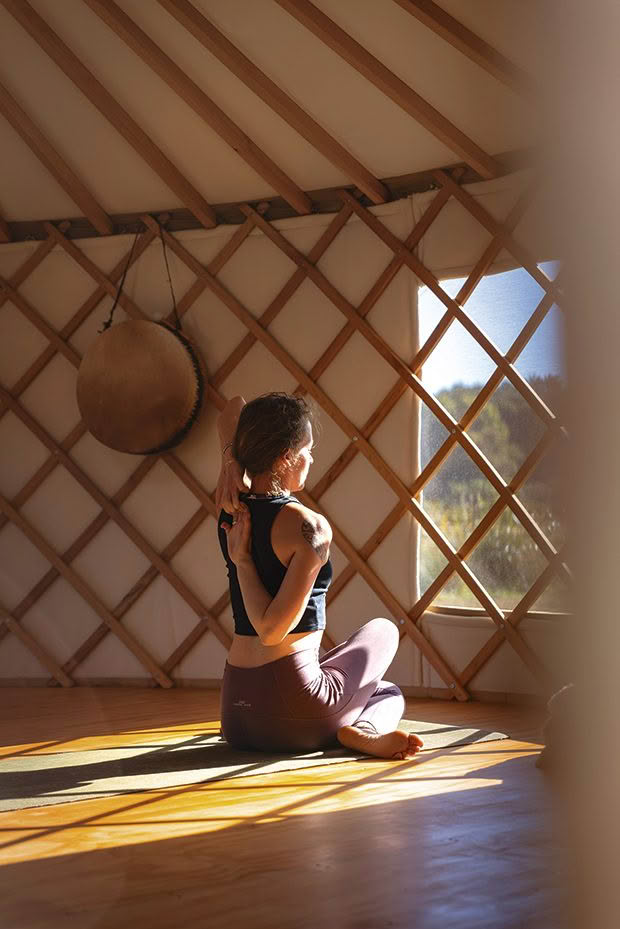
The Kōtuku Sanctuary is where workshops and yoga classes are run by instructor Maura (maura.bodywork). Locals can also attend her yoga classes and massage sessions. “It’s something new for the area and has been a nice way of getting to know our neighbours,” says Jo.
“One of the onlookers yelled out as we drove the sheep past: ‘Girls can do anything!’ It was an awesome achievement.”
Much time is spent on the balcony, gazing at all their hard work. “That second year here on our own was just us going, ‘We can do any of it, and we’ll do it at our pace.’ Our biggest trial was when we thought we couldn’t do it alone. But we can. And we’ve achieved a hell of a lot.”
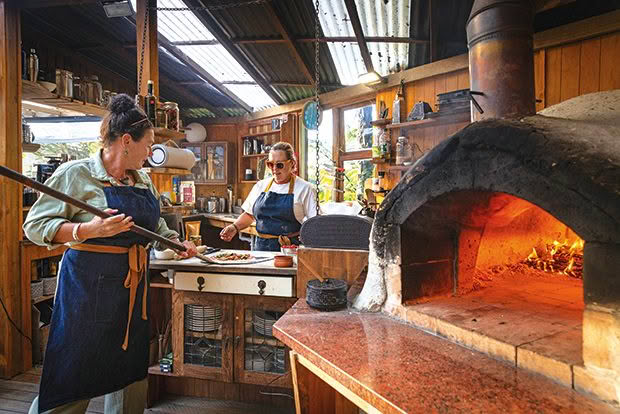
Jo and Kellianne often host their neighbours for pizza nights or Sunday roasts.
They have held several retreats, with business coming through a network of friends, previous clients, and word of mouth. Guests sleep in pods screened by the kānuka trees of the adjacent national park and do workshops in a handmade yurt. Nourishment is a plant-based menu courtesy of Kellianne — “an incredible cook”, according to Jo — who honed her skills during the 17 years she spent with Änt in Cambodia.
Änt and Kellianne met at the World Expo in the late 1980s before travelling through Southeast Asia to Hong Kong.
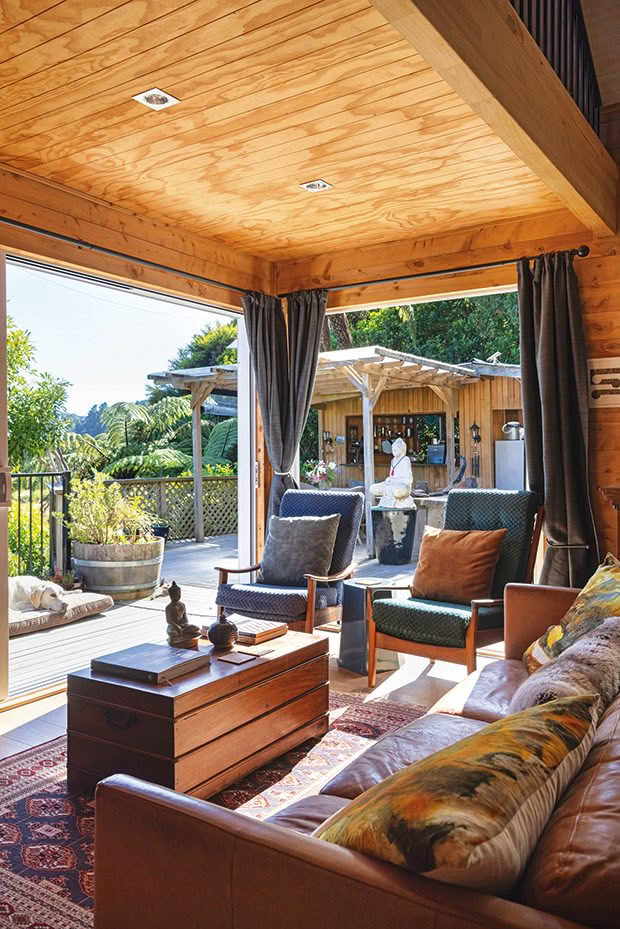
It isn’t just retreat guests who enjoy the serenity of The Farm Awaroa. There are five permanent households in the small community, whose inhabitants look out for each other, especially in the off-season.
An investor approached them to open a restaurant in Vietnam before they made their way to Cambodia. It was in the early 1990s when 20,000 United Nations peacekeepers had been dispersed throughout the war-torn country. There wasn’t enough food to feed them. Änt and Kellianne opened a restaurant and pizzeria.
“When I arrived in Cambodia at 21, the country had just emerged from war. There wasn’t a lot on offer, and it was a challenging way of life,” she says. “Being on the farm offers the same feeling of what life in Cambodia was like: you wake up every day and you’re challenged. And that felt good to me. It gave me direction and motivation.”
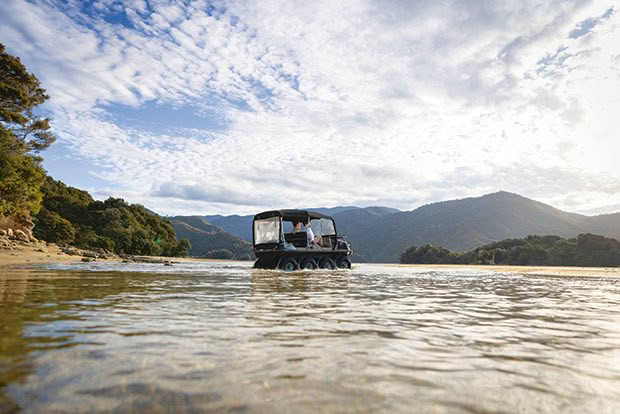
Jo and Kellianne’s Argo is an amphibious extreme terrain vehicle (XTV), which can cross the estuary no matter the tide.
During her years in the kingdom, Kellianne hosted many journalists, diplomats and solo travellers needing a wholesome meal and a rest. “It also shows up in our life here — we love to host people. There is a lot of manaakitanga in what we do.”
Providing for transient types must be in the family DNA. Kellianne and Änt’s 14-year-old son Zac stays during school holidays and found a way last summer to keep walkers’ spirits high when trudging the Abel Tasman track. “He started selling homemade chocolate chip cookies and lemonade. That will probably grow next summer. People loved it; he made some money, and he loved chatting with all the different nationalities. He’d come back with all these stories from around the world.”
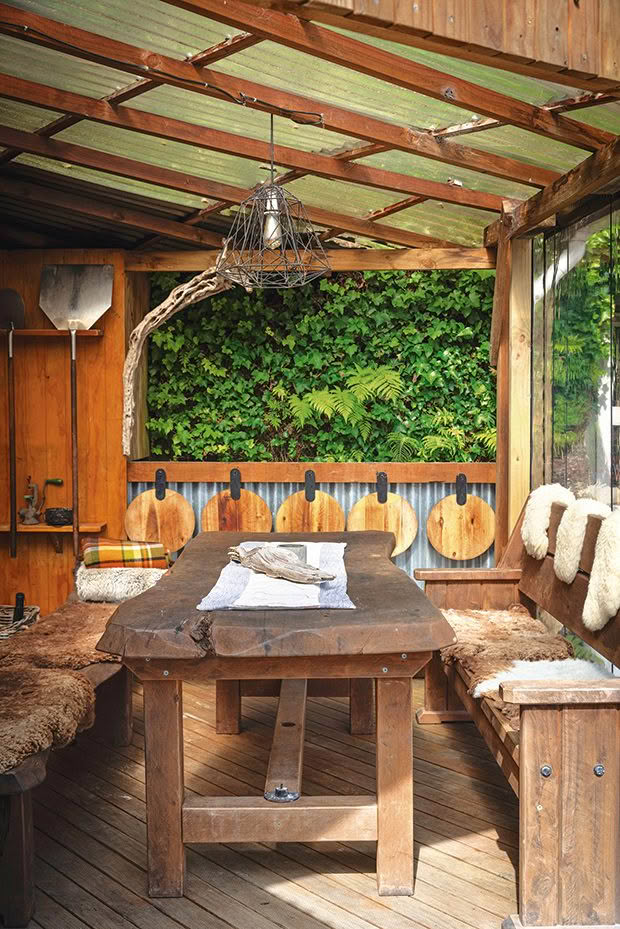
Jo’s 17-year-old daughter Cassidy works at the neighbouring Awaroa Lodge during school holidays. “And that’s the vision we had and wanted: to have the sort of place where the kids can grow and keep coming back to.”
The closeness of this family — the one they were born into and the one they grew into themselves — is often a surprise to guests and friends. “Many people say, ‘Oh, I couldn’t live and work with my sister,’” says Kellianne.” But we get on extremely well, and complement each other.”
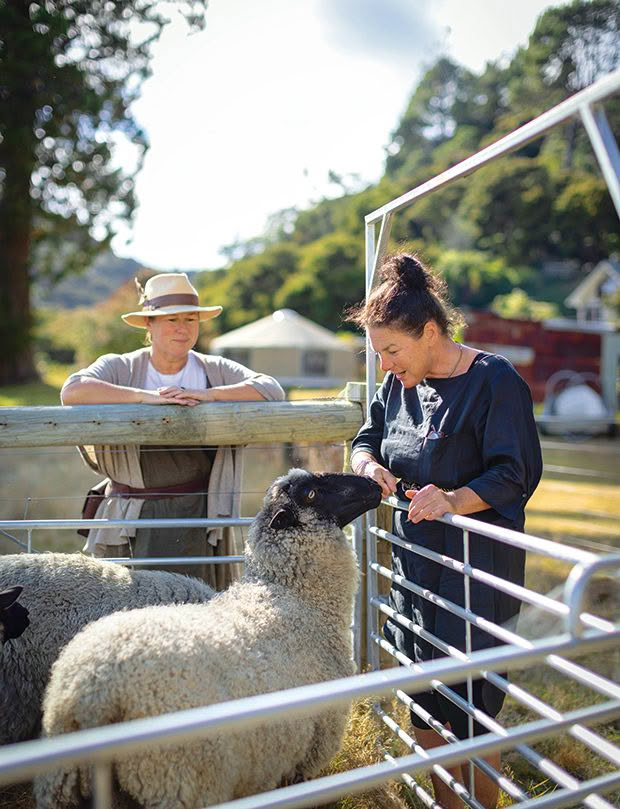
After two years, the sisters are almost entirely living off the land. They say they’ve formed a special bond with the sheep they had to move — with little farming knowledge — across the estuary in an early farming challenge.
“We have a beautiful flow in what we do,” adds Jo. “I always say it feels like we’re on a journey home. Home to ourselves and home to our roots, and probably to a more old-fashioned way of living. A simple way of living.”
PUSHING RESET
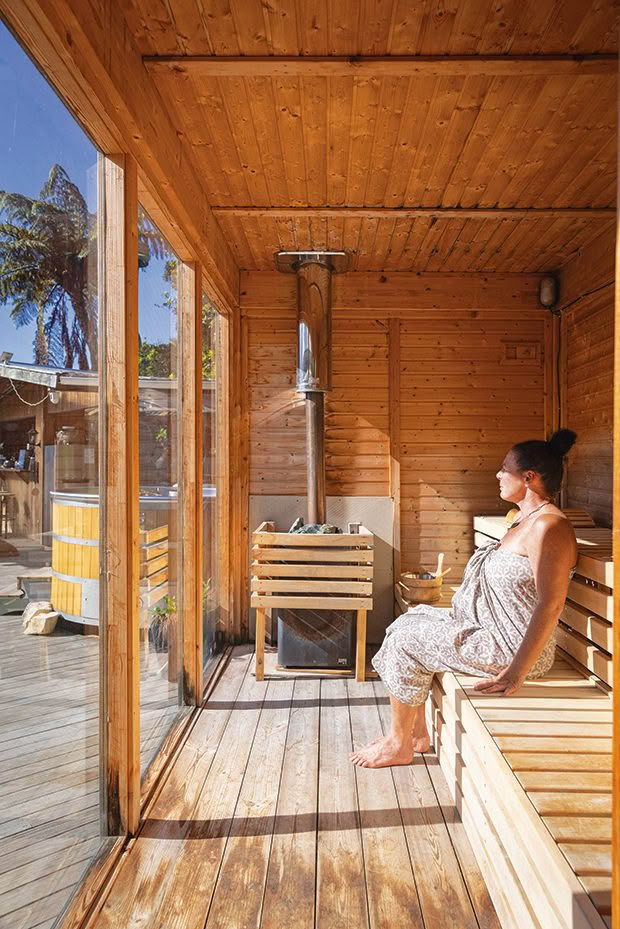
The Farm Awaroa is on the Abel Tasman Coast Track, one of New Zealand’s busiest Great Walks. Upwards of 200,000 visitors use the track each year.
“It’s awesome and a part of us being here. But instead of tapping into that market, we just felt that we would like to have people here on a healing journey.”
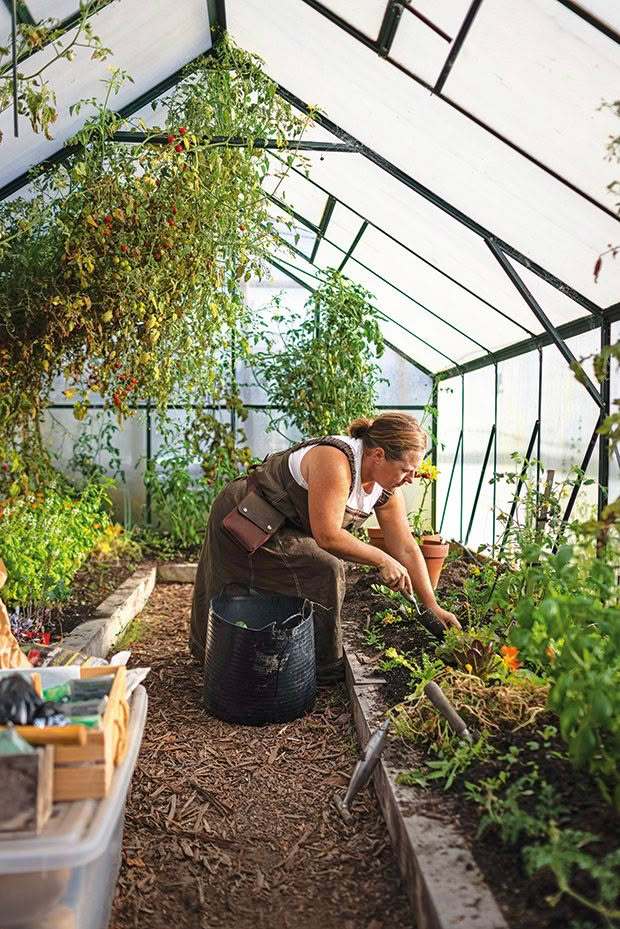
Retreat guests eat an almost entirely plant-based diet, primarily sourced from the garden and cooked by Kellienne. “We’re not plant-based eaters all the time ourselves, but we’ve decided that feeding lighter food while people stay here helps them to ground into the nature around them.”
This means that the sisters also open the farm for cultural creative workshops and two- and five-day wellness retreats for those seeking solace.
“We collaborate with facilitators to host their guests and support their offerings. The magic is in the location, nestled into the native bush.
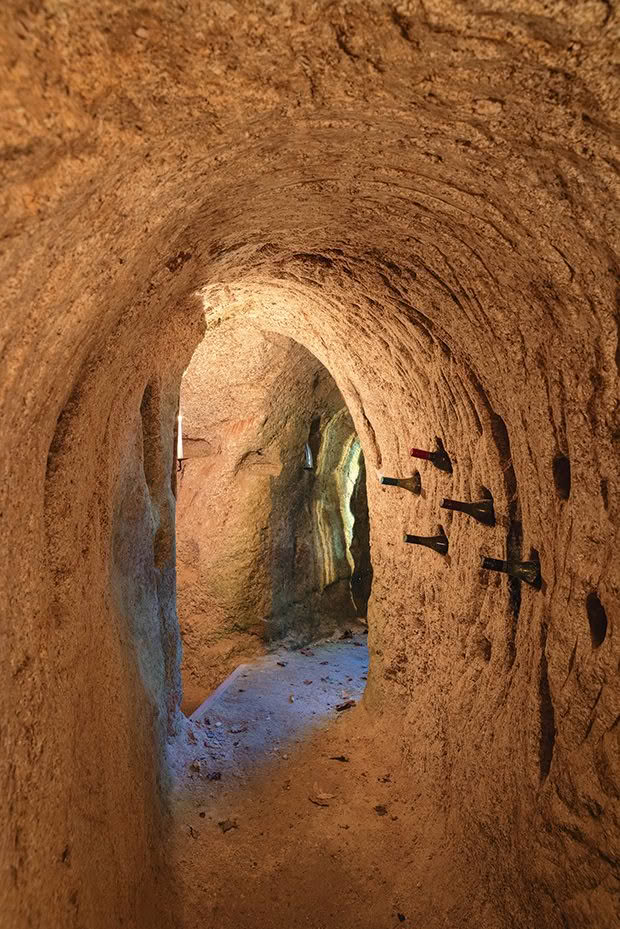
The sisters say that stepping into the cave carved into sandstone lime granite on the property can be a profound experience for guests, as can taking a moment to recharge in the sauna.
“The custom-built yurt — named the Kōtuku Sanctuary — acts as a space for gatherings, as does the cave carved into sandstone lime granite on the property.”
A wood-fired hot tub and sauna provide places to warm up after a dip in the ocean, while the accommodation pods — built by the previous owner — are where the most hardened insomniacs often get some sleep.
“People arrive and say they don’t sleep, that they’re insomniacs … and then they sleep 12 hours every night,” says Jo.
“We’ve had feedback that people have found it quite profound to spend five solid days being nurtured — it’s rest and reset, it’s learning to bring routine to their lives, learning to put health first.”

